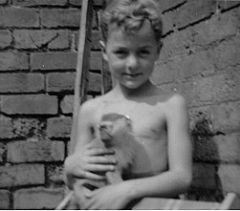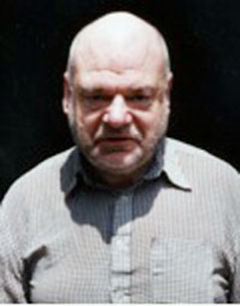Carl Poll gets to the heart of why the relationship between professionals and citizens can often go so wrong - and what we can do about it.
Author: Carl Poll
Carl Poll gets to the heart of why the relationship between professionals and citizens can often go so wrong - and what we can do about it.
Some years ago at a conference called ‘From Client to Citizen’, I had the opening remarks slot. I thought I’d talk about the big issues of the conference - capacity and deficit, the problem with services and top down community development approaches and the need for a new power balance between paid people and those they serve.
Then I remembered I only had ten minutes so I showed a picture of me with my monkey, instead.

This picture takes me back to the yard of my mum and dad’s fish and chip shop in 1957.
I was about this age when I went next door to Mr Holt’s grocery shop and announced to neighbours that when I grew up I would go to university. I had no idea what a university was.
My mum and dad heard about this and were proud. It was like I had already been. So an expectation grew in the family that I would go to university. I felt confident.
Then, at secondary school, I overheard a teacher talking about me. He said ‘Poll is not of university calibre.’ I don’t know if it was at this moment that my problems started but that’s how I remember it. I moved pretty quickly from certainty to self-doubt and I didn’t get into university. In the end, the teacher was wrong because I did eventually go and I did ok. But it was around this time that I became a suitable case for treatment – convinced of my own failure – raw material for the counselling and psychotherapy industry.
It’s not that psychotherapy is always a bad thing. But I would rather have spent my time and money on motorbikes or getting involved in things in my neighbourhood.
The problem was that my teacher focused on my deficits and it had big consequences for me. John McKnight, Professor of Community Development At Northwestern University in Chicago (and a speaker at ‘From Client To Citizen’), often uses the glass half-empty/half-full idea as a way into talking about an assets approach to individuals, and maintains that it’s a simple choice of whether you choose to see the negative (which produces unusable information about people’s deficits) or the positive (which is usable for building the participation and confidence of individuals and the richness of communities).
My teacher was in no doubt that I was empty.
In services, we generally have no doubt either. We have usually been interested in the things people can’t do. This has changed in some places but there are plenty of services in which the old sprit prevails. In learning disabilities services there is person-centred planning. But the needs-led assessment has been the dominant approach to planning people’s services and it’s not impossible to rebadge a needs-led assessement as a person-centred plan.
(If you are in any doubt about the impact of a needs-led assessment – try it on yourself. Get seven or eight people together in a room. Make sure you don’t know some of them. None of them should be your friends. Then get them to list your failings. This probably won’t feel too good.)
The problem with this approach is that it wastes money on getting professionals to do things for people which people would be better off doing for themselves. Marginalised people are experts on all kinds of things – certainly experts on their own lives, their own feelings, their own neighbourhoods. And amongst them is a veritable Yellow Pages of untapped gifts and talents.
Even when we try and take a positive approach, we can get it horribly wrong. In job interviews at KeyRing, where I used to work, we sometimes asked ‘what do you think of people with learning difficulties?’ It was a neutral question. But people had interesting responses – ‘cuddles and sunshine smiles’ was one.

Roger, a KeyRing member, kindly agreed to show this picture of himself to demonstrate that ‘cuddles and sunshine smiles’ doesn’t quite cover it for him or anyone else with or without a learning difficulty that he or I have ever met. (Roger has a great smile and is, for all I know, a great cuddler - when he chooses).
But there’s no room for smugness about this. Even at KeyRing, where we were completely focused on the things people could do rather than their deficits, I think we only got part of the story – at least while I was still there.
And what holds us back is perhaps a certain professional distance from the people we support – a certain aloofness in which (in some measure deep down, hidden below our words) we think we are experts and that’s our job – to be the experts on people with learning disabilities.
I think KeyRing is one of the very best service providers but if we are really going to support people to take their place as citizens, we have got some unlearning to do. We need to adopt some of the participatory approaches which are used in overseas development work – with some of the most disenfranchised groups in the world – but hardly at all in this country with people with learning difficulties.
We need to slow down, listen, learn from the real experts – the marginalised and disenfranchised people we work with. This slowing down is a problem for professionals because we are in such a rush. Government has pushed organisations to spend more and more of their resources on procedures, performance monitoring and form filling. There’s less and less time to spend listening to people.
Inventiveness, creativity, spontaneity, improvisation, reflection and, above all, creating the space for us to learn from the people we support are under threat at a time when we need a huge increase in the supply of all these things.
We need to get rid of professional distance. If people are going to escape a world of services and play a role in civic life, professionals have got to stop thinking they are the experts, the teachers, the givers.
We need to ‘think’ more with our experience and our emotions. We are all experts on our own lives and we all, in some way or other, share the experience of being a ‘client’. This is not to say we should, in supporting people, say ‘you think you’ve got problems, just listen to mine…’ or go around thinking we know what it’s like to be disabled or be a refugee, or have mental health problems – we generally don’t and we must not deny the experience of people with disabilities, or mental health problems, or refugees or whoever.
But if professionals, in making their plans, ‘thought’ more with their experience and emotions, they wouldn’t make so many atrocious, inhumane decisions about people. If they thought ‘would I place my child in this residential care home?’ when they are about to take that decision about a ‘client’ – fewer people would be trapped in awful residential care homes.
Michael Moore puts it in a nutshell in Stupid White Men: ‘When it hits home, it’s very hard to keep acting like an asshole’.
When it’s me, my family, people I care about, I’m going to make more human decisions. Let’s extend that care and humanity to the people who suffer us as professionals. (And, in any case, who wants to be remembered as an ‘asshole’?)
The publisher is The Centre for Welfare Reform.
Don't Monkey with People's Lives © Carl Poll 2011.
All Rights Reserved. No part of this paper may be reproduced in any form without permission from the publisher except for the quotation of brief passages in reviews.
community, disability, intellectual disabilities, Keys to Citizenship, England, Article
England
Developed the idea for a radical housing support model for people with learning disabilities